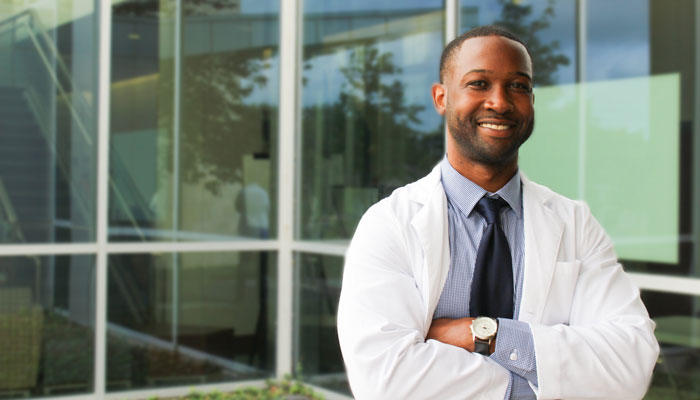Seeking ways to save lives
By Betsy Friauf

“My cousin was a beautiful person inside and out, 27 years old, but her cancer kept recurring,” says Lee D. Gibbs, PhD. “I was about 13 years old when I went to see her in Houston. They were about to remove her second ovary. It was near the end of her life.”
Gibbs always was the sunshine in his family’s dark moments, cheering people up. “But this time it didn’t work.”
2017 Commencement CeremonyWhen: 9 a.m. Saturday, May 20 Other highlights:
|
“I realized right there, this is what I want to do in life. I want to figure out why this happens to people.”
On May 20, Gibbs gets his diploma at the UNT Health Science Center’s Commencement. With a PhD in Biomedical Sciences-Cancer Biology and prestigious high honors on his dissertation, his life’s work is finding ways to tailor treatment for rare and aggressive cancers.
His next step: national and international cancer projects through a postdoctoral fellowship in the Translational Genomics Department at the Keck School of Medicine at the University of Southern California in Los Angeles.
Adventurous spirit
Many things came together to put Gibbs where he is. At the top of the list he puts God and his parents, who encouraged him to be adventurous.
He was riveted by science from middle school on. But as an African American, “I didn’t see anyone like me doing what I wanted to do.”
His parents encouraged his curiosity. “If I said to my dad, ‘What does this word mean?’ he would say, ‘Look it up.’ So I learned to find out for myself and be independent.”
As an undergraduate at Xavier University of Louisiana, he went to a workshop and heard UNTHSC Professor Jamboor K. Vishwanatha, PhD, discuss his interests and projects focusing on health disparities.
“I had never even been to Fort Worth, but I knew right then and there that the UNT Health Science Center was where I needed to be” Gibbs said. “I never knew how much an education at a health science center could offer.”
Teamwork at UNTHSC propelled his career
He credits interprofessional opportunities at UNTHSC with helping him land his postdoc fellowship at USC. He served as chair and co-chair of the Interprofessional Student Coalition and was a member since 2012. The coalition hosts round-tables that bring together students from each UNTHSC school – Graduate School of Biomedical Sciences, Public Health, Pharmacy, Texas College of Osteopathic Medicine, School of Health Professions (Physician Assistant and Physical Therapy) – plus other schools such as the TCU nursing school, to discuss a topic like obesity or smoking cessation. “It breaks down silos,” Gibbs said.
“Team-based care will be the future in the U.S.,” he said. “This interprofessional work at UNTHSC was the ‘best sell’ for me to get into USC.”
His PhD project was an interdisciplinary investigation of triple-negative breast cancer markers in African American women. This rare and aggressive cancer has a high mortality rate among women ages 20 to 34. In addition to UNTHSC, his project involved Plaza Medical Center, UT Southwestern and the University of Alabama.
He has published his findings and has more in the works, supported by grants and involving more collaborators.
Plunging in, giving back
Another way he was adventurous was plunging straight into the doctoral program. “It was hard to imagine doing it without earning a master’s degree at first, but I’ve had great mentors.”
He has traveled back to his undergrad school to encourage students to follow careers in biomedical research.
Tuition was an issue when he was in high school and considering attending college at a private university. The National Institutes of Health’s Minorities Access to Research Careers (MARC) program helped, and also provided access to many new opportunities including his first airplane flight.
Funding started landing at his feet, literally. “One day I was walking and I stepped on a brochure. I applied and got some funding to continue my education.”
But he doesn’t believe in coincidences. “God has put me in places for a reason,” Gibbs said. “I saw my aunt and uncle have to deal with losing their only daughter, which set me on this path.”





Social media